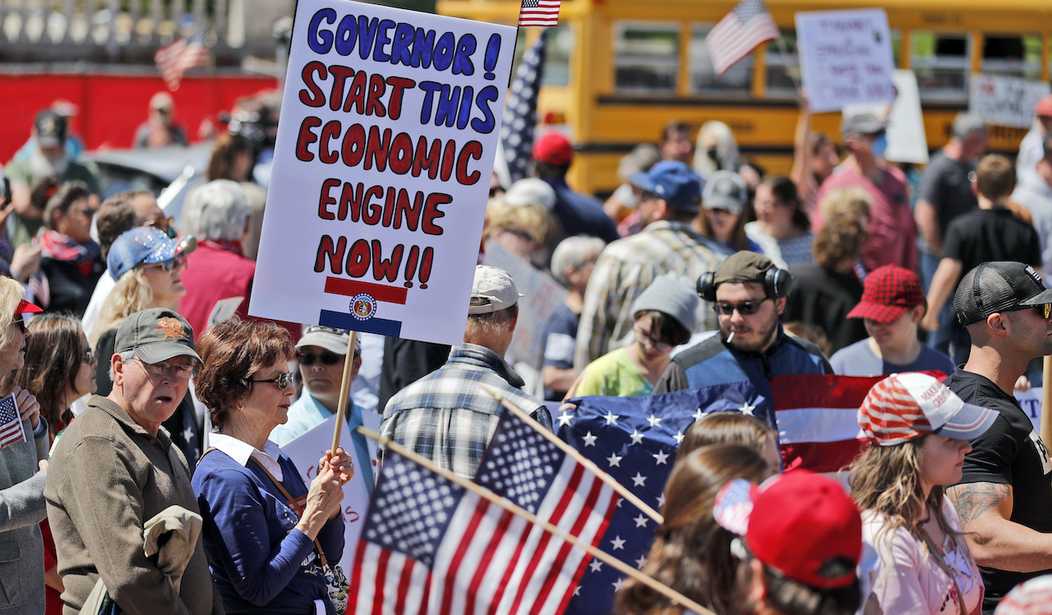Millions of Americans have lost their jobs during the coronavirus crisis, and firms across the country are struggling to avoid going out of business entirely. Meanwhile, many states and localities are fighting to extend lockdowns even longer. One enterprising state lawmaker in Minnesota has posed an interesting question: What if state and local governments had to compensate businesses for the mandated closures in the same way they have to compensate landowners when they use eminent domain to seize their property for roads?
Such a bill would not only provide businesses a way to make themselves whole after lockdowns but it would also make governors and local officials more hesitant to extend the orders shutting down broad swaths of the economy.
Republican State Rep. Shane Mekeland, a victim of politically-motivated violence egged on by Democratic leaders, introduced H.F. 4651, a bill allowing business owners to request compensation for lost income and lost property due to a peace-time emergency order.
In a Wednesday radio interview on the show Justice & Drew, Mekeland said the idea came to him after a friend of his father lost his property in an eminent domain action and fought for just compensation. In recent weeks, “businesses are calling us daily, looking for some kind of help somewhere” due to the lockdowns, and it struck him to “put this type of executive action in the same bucket as eminent domain.”
Mekeland provided a copy of H.F. 4651 to PJ Media.
“An owner … may bring an action in district court to compel the state to commence condemnation proceedings and payment of just compensation for loss of income during, and for a reasonable period of time after, a temporary partial or complete closure of the business that would not have occurred but for compliance with the executive order; or loss of going concern, including the loss of real property, if the closure of the business results in the owner going out of business and the owner would not have gone out of business but for compliance with the executive order,” the bill states.
According to H.F. 4651, the business owner “has the burden of proving that the loss is due to the executive order and proving the amount of compensation for losses.” The owner must file the petition within one year of the end of the executive order in question.
Jeff O’Brien, Mekeland’s lawyer, explained that the bill is not focused on relief for small businesses — like recent federal legislation — but rather on providing compensation.
“It’s not relief, it’s just compensation,” O’Brien said. “What we need is an expansion of our eminent domain laws.”
“Why should somebody be treated differently for having a business shut down for an executive order versus having a chunk of their land taken for a highway?” the lawyer asked. “The idea behind it is, ‘Fine, government, you have this public purpose, you have to do this, but you need to go find your checkbook because you don’t just get to take something from someone.’ You can’t take something from a citizen and not pay them for it.”
O’Brien suggested that if government officials knew that extending lockdown orders would cost more in compensatory payments to businesses, they might think twice about keeping businesses shuttered. This would likely result in “a more measured response from the governor.”
Indeed, the comparison to eminent domain is very apt. Eminent domain allows the government to seize property so long as it provides just compensation. Like the seizure of property in order to build highways, the coronavirus lockdowns represent an important public purpose — but they also cost business owners a great deal. If the government must make landowners whole when it seizes their property, it should also make businesses whole when it orders them shuttered for a limited period of time.
Otherwise, the government has the ability to declare a business’s income — and in many cases, its very ability to remain in operation — forfeit without providing any compensation. Eminent domain provides a way for businesses to accept that the lockdowns were necessary and governments to restore justice by making those businesses whole.
Sadly, it seems unlikely H.F. 4651 will become law in Minnesota, and governments will likely reject this idea because the costs for the lockdowns would be extremely steep. Even so, the proposal highlights the fact that government lockdown orders — even when necessary — should involve just compensation. After all, governments have effectively stolen these businesses’ ability to operate during this pandemic. If governments have to make landowners whole after seizing their property, they should also compensate businesses hit hard by the lockdowns.
Tyler O’Neil is the author of Making Hate Pay: The Corruption of the Southern Poverty Law Center. Follow him on Twitter at @Tyler2ONeil.
Editor’s Note: Want to support PJ Media so we can keep telling the truth about China and the virus they unleashed on the world? Join PJ Media VIP and use the promo code WUHAN to get 25% off your VIP membership.









Join the conversation as a VIP Member